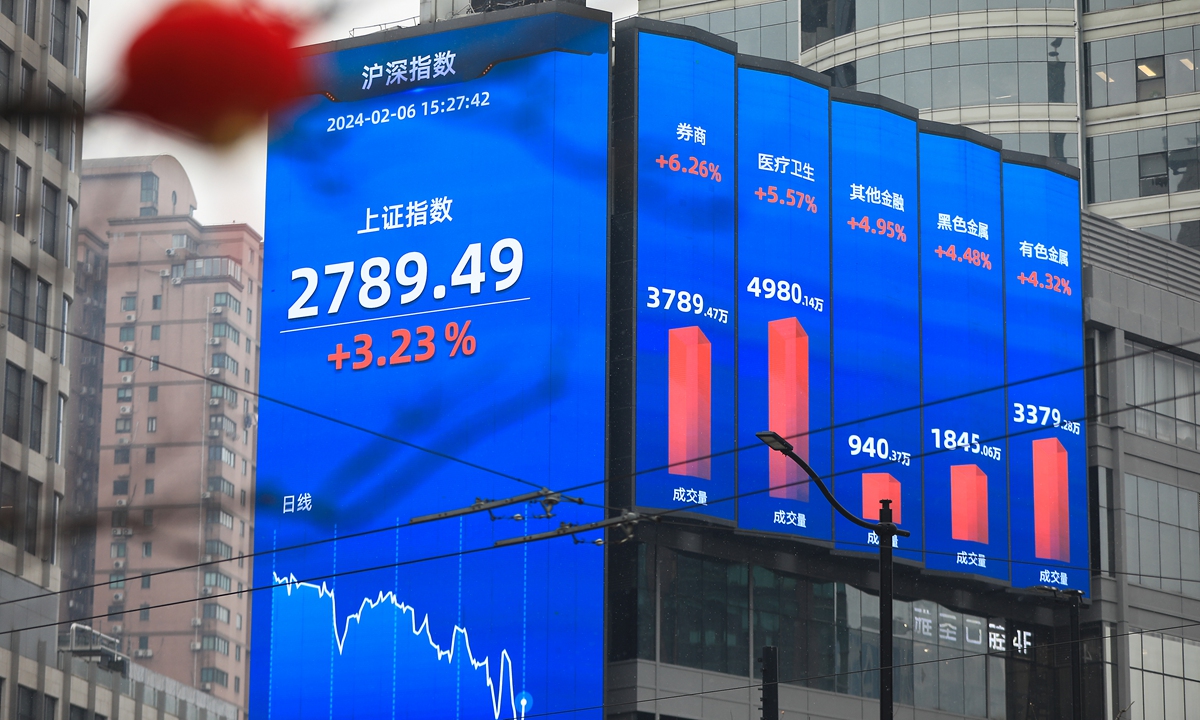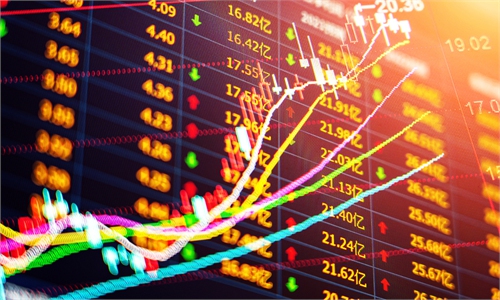China equities record biggest gain in 14 months on Tuesday amid authorities' all-out effort to stabilize market

An outdoor billboard in Shanghai shows Shanghai Composite Index rebounding 3.23 percent to 2789.49 points on February 6, 2024 with brokerage, medical and metal sectors seeing robust increases. The net inflow of "northbound capital," or overseas money flowing into China's A-share market through stock connect programs, hit 12.605 billion yuan ($1.77 billion) on Tuesday, setting a new record since December 2023. Photo: VCG
Chinese stocks on Tuesday have reportedly recorded the biggest gain in 14 months, reversing some of the losses after a straight six-day dip and a spiraling January, with the benchmark Shanghai Composite Index rebounding 3.23 percent to close at 2789.49 points, and the Shenzhen Component Index and ChiNext Index all soaring over 6 percent.
The recovery comes as state-owned Central Huijin Investment - deemed as a key player in the "national team" - pledged on Tuesday to ramp up investment in the A-share market, a timely boost to defuse looming liquidity stress, and as China's top securities regulator has recently mulled over what some industry insiders dubbed as an "all-out effort" to shore up market and crack down on illicit conducts.
Analysts said these concrete measures have sent a clear signal of Chinese authorities' steadfast resolution to safeguard the stability of the capital market and foster its healthy development. Tuesday's rally also mirrors investor's recovering confidence in Chinese equities, which analysts believe "could have gradually stabilized" as it took some time for the market to digest panic sentiment, and jotted investors have calmed to some extent with a raft of robust policy support.
While some Western media outlets have hyped the recent market fluctuation to disparage the Chinese economy, observers dismissed such rhetoric, pointing out that regardless of short-term turbulence, the long-term positive momentum of the capital market won't change on the basis of China's upbeat economic prospect and the inflow of more medium- and long-term capitals.
The joining of 'national team'
The transaction volume in Shanghai and Shenzhen bourses reached 926.3 billion yuan, up 48.9 billion yuan from Monday. Over 3,800 individual stocks have rallied in contrast to Monday when over 4,800 stocks plunged, including more than 1,000 which slumped by their daily trading limits.
That represents a swift turnaround from a challenging Monday, when the benchmark Shanghai Composite Index once slumped to below the 2,650-point and hit a five-year low. In January, the index tumbled around 5 percent.
The net inflow of "northbound capital," or overseas money flowing into China's A-share market through stock connect programs, hit 12.605 billion yuan on Tuesday, setting a new record since December 2023.
On Tuesday morning just after the market opened, Central Huijin Investment announced plans to broaden and deepen its holdings in major Exchange-Traded Funds (ETFs), a move aimed at bolstering the stability and healthy operation of the A-share market.
Central Huijin Investment, a subsidy of China's sovereign-wealth fund China Investment Corporation, is regarded as a core member of the "national team." Central Huijin's strategic investments are focused on key state-owned financial enterprises, representing the state in exercising shareholder rights and obligations, according to the company's official website.
"The pronouncement of 'national team' joining is consequential to stabilizing market confidence. On the one hand, it shows a fully endorsement on A shares whose valuation should be kept in a reasonable range despite recent turbulent rise. On the other hand, it helps to defuse market financing risks and reverse a deep downturn," Yang Delong, chief economist at Shenzhen-based First Seafront Fund Management Co, told the Global Times on Tuesday.
The capital market is one of a country's economic pillars. Safeguarding the value of yuan-denominated assets is also crucial in potential financial and economic war against China, Yang noted.
It is important to prevent the market from sliding further, as it would "jeopardize the interests of individual investor and the market, with domino effect on other aspects of finance and macro economy," Dong Shaopeng, a senior research fellow at the Chongyang Institute for Financial Studies at the Renmin University of China, told the Global Times on Tuesday.
In response to the move, the China Securities Regulatory Commission (CSRC) voiced its support for the proactive investment approach on Tuesday, highlighting the A-share market's current low valuation and its potential for medium to long-term investment.
"We're committed to facilitating Central Huijin's market operations and are actively encouraging a broader spectrum of institutional investors to increase their market participation. This includes public and private funds, securities and insurance companies, and pension funds, among others. The CSRC's efforts are aimed at attracting more capital to the market, supporting company buybacks, to shore up Chinese equities," CSRC said in a Tuesday statement.
On heels of Huijin's announcement, high-volume purchases were notable in specific funds on Tuesday, including the Southern CSI 500 ETF and CSI 1000 ETF, which saw unprecedented single-day buying sprees.
Sweeping, decisive step
In addition to the Huijin statement, CSRC on Tuesday also issued another three statements aiming to address various aspects of the securities market, protect investors' interests and instill confidence into a stock market that has been embroiled in outsized volatilities lately.
The regulator vowed on Tuesday that it will, in accordance with the law, suspend securities companies' new business involving lending certain shares for short selling, and will gradually settle the existing business.
On the same day, it also held two symposiums themed on elevating the investment value of listed companies as well as mergers and acquisitions of listed companies, respectively.
In a rare move, CSRC has issued a total of 13 policy stance statements since Sunday, the speed, the extent of scope and the wording of which were all unprecedented. For example, the commission on Monday sternly warned against malicious short sellers. "Those who dare to engage in market manipulation and malicious short selling will be bankrupted and jailed," it said.
Xi Junyang, a professor at the Shanghai University of Finance and Economics, told the Global Times on Tuesday that CRSC is making sweeping steps to "erase all negativities that could weight on the capital market to forestall overselling."
Since relevant mechanism to curb short selling was implemented, the balance of securities lending has dropped 24 percent to reach 63.7 billion yuan ($8.86 billion), according to CSRC.
With regards to market concerns that stock pledge defaults could lead to large-scale liquidation that further fuels market dive, CSRC said on Monday that it will guide brokerages and other financial institutions to increase the flexibility of the margin call lines and promote the smooth operation of the market.
CSRC officials also stressed in various statements that the commission will put investor interest first and foremost in equity market system design and regulation enforcement.
"It is important to note that when the market is near the bottom and the mood still jittery, the confidence of individual investor is more precious than gold. In this vein, we could see Chinese authorities' unswerving resolution to repair investors' confidence and a clear government strategic plan to draw in more long-term capital inflow," Yang said.
Dong noted that there may be certain fluctuations in the following day, but it is expected the market will return in normalized operation once the market digests all the downsides. There are also expectations on more policy boost this week.
The Chinese equities are of great value proposition taking account of their price-to-earnings ratio, relative valuation to major overseas market as well as the country's bullish economic outlook, officials and analysts stressed, while rejecting certain media's attempts to cite claimed pessimism on Chinese economy as a source for capital market volatility.
Renowned international investor Jim Rogers told the Global Times in a recent interview that he is optimistic about Chinese stock market recovery. He particularly took note of investment opportunities in emerging sectors such as electric vehicle.
"The operation of Chinese capital market is driven by both the financing and investment mechanism as well as supply-demand balancing mechanism," Dong said. He urged foreign media outlets to gauge the Chinese economy in a more objective and comprehensive way.

